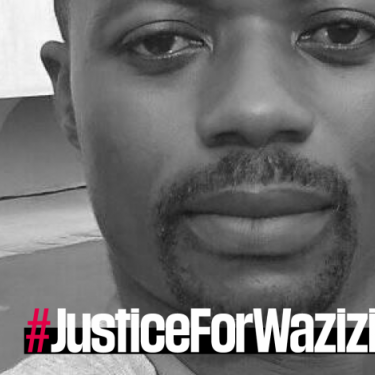Cameroon Findings of enquiry into journalist Samuel Wazizi’s death in detention must be published

15 months after Cameroonian journalist Samuel Wazizi’s enforced disappearance and six months after it was confirmed that he died in detention, the country’s authorities are still tight-lipped about the circumstances of his detention and his death. ACAT-France and Reporters Without Borders (RSF) urge the president’s office to publish the report of the investigation and its conclusions.
Detained and accused by the Cameroonian authorities of being a terrorist, Samuel Wazizi disappeared on 7 August 2019, the date on which he was removed from a police station in the western city of Buea and taken to a military installation in the same city.
A journalist working for Chillen Music Television (CMTV), Wazizi had been arrested by the Buea police five days earlier, on 2 August 2019, when he told his lawyer – the last of his friends and associates to see him alive – that he had been arrested for criticizing the government’s handling of the crisis in the English-speaking parts of the country.
It took ten months for the Cameroonian authorities to concede that Wazizi died in detention, and they did so only after reports of his death in the national press.
Col. Serge Cyrille Atonfack, the defence ministry’s spokesman, said on 5 June 2020 that Wazizi, who he described as an “active member of a separatist group,” had died of a body-wide infection in Yaoundé’s military hospital on 17 August 2019. “He was not subjected to any act of torture of physical mistreatment,” Atonfack claimed, adding that the family had been notified.
For ten months, the Cameroonian authorities concealed his death and refused to provide any information about his fate to his family and lawyers, and to NGOs that had raised the issued. The Cameroonian judicial authorities themselves seemed to know nothing about what had happened to Wazizi when his and his family’s lawyers petitioned the courts in a vain attempt to get information.
Reporters Without Borders (RSF) has seen photos of Wazizi that were taken in Yaoundé, the Cameroonian capital, on 13 August 2019, the day that he was brought there from Buea. The photos show many injuries on different parts of his body.
“A journalist in perfect health who suddenly dies in detention while presenting injuries typical of acts of torture, a family that was never notified although the authorities say it was, a justice system that continued to receive petitions from lawyers about a journalist who had been dead for months, an extremely belated and reluctant recognition by the authorities of his death, and a body that was never returned to the family... Much still needs explaining but the Cameroonian authorities are as silent as ever,” said Arnaud Froger, the head of RSF’s Africa desk. “The absence of credible explanations led us to refer this case to three United Nations special rapporteurs in August and to ask them to press the Cameroonian authorities to conduct an investigation into the exact circumstances that led to this journalist’s death.”
Clément Boursin, who is responsible for Africa at ACAT-France, said: “The National Commission on Human Rights and Freedoms (CNDHL) told ACAT-France on 9 October 2020 that an investigation was carried out by military intelligence and the findings were given to President Paul Biya. However, although it is supposed to be independent and impartial and although it should use all of its influence to ensure that light is shed on a journalist’s death, the CNDHL told ACAT-France that, ‘in the light of Samuel Wazizi’s terrorist activities at the time of his arrest, we do not think it is essential for the president to publicly report the details of this case’.”
Was the enquiry independent and impartial? Was it carried out by an agency that was not involved in this journalist’s detention? What methods did it use? Was there an autopsy? In the absence of any communication about the enquiry’s findings, many questions remain unanswered about the circumstances leading to Wazizi’s death.
The Cameroonian authorities were responsible for Samuel Wazizi’s safety while they were holding him. They must provide his family and lawyers with a complete account of the circumstances of his detention and death, ACAT-France and RSF insist.
Wazizi’s body has still not been returned to his family. Until the family recovers his body, he will continue to be a missing person.
Transparency is needed to shed light on Samuel Wazizi’s death. Those responsible must be identified.
Cameroon is ranked 134th out of 180 countries in RSF's 2020 World Press Freedom Index.



